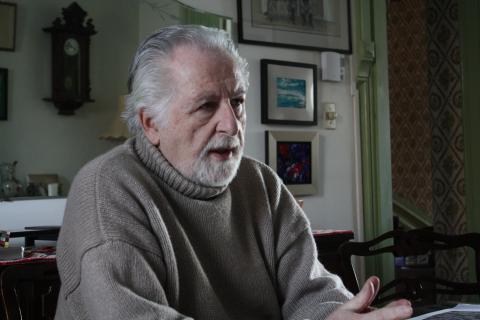National Sovereignty Does not Exist Anymore

Political Ecology: Beyond Environmentalism is now out on New Compass Press. This classic work in social ecology – still as relevant today as it was in the early 1990s – explains the history of the environmental movement and its future prospect. The 2015 book is a greatly expanded and revised edition. As a small taste we publish the brand new epilogue by Dimitri Roussopoulos here.
At a time when a blind driving machine called the market is turning soil into sand, covering fertile land with concrete, poisoning air and water, and producing sweeping climatic and atmospheric changes, we are forced to pose fundamental questions about the nature of our society. This book is an attempt to grapple with the ecological crisis, on the one hand, and the aggrieved state of modern society, on the other. We cannot ignore the structures of oppression or repression in our society, the concentration of power in hierarchy and class and the systemic addiction to greed, all of which are dominant factors beneath the headlines of the social and ecological crises.
The events of the month of July, 2015 are a particular case in point. The brutal power of capital and the political elite that control the Eurozone were at their vicious worst when they came down on Greece during the weekend of 10-12 July, 2015. Rarely has the naked force of neoliberalism been so visibly displayed. Draconian economic and political conditions were almost unilaterally imposed on a country, a demonstration that the era of national sovereignty is a line of defense in the past. This show-case of the neoliberal “shock doctrine” was also a clear warning to other European political parties and countries that international finance capitalism will not permit them to step out of line.

Image: A new and revised edition of Dimitri Roussopoulos' Political Ecology is now out on New Compass Press.
In the face of Eurozone blackmail, Greece has been inflicted by austerity policies as if it was a neoliberal laboratory of the Eurocrats. Indeed, despite the arrival of a radical Left Greek government, the hope of the European anti-austerity movement, this very same government quietly surrendered after less than six months in power; the agreement accepted by the Syriza government was exactly what a national referendum had rejected by a majority of some 61% of the voting public less than a week before. The dictates of international finance thus ensured that the arrogant power of foreign bureaucrats and politicians determined the political direction of the country totally in spite of an explicit democratic expression of popular sentiment. And yet, there was no consistent mass opposition by the people in the streets and public places against the government’s reversal of the referendum results.
This case shows, if nothing else, that the power of genuine national sovereignty barely exists within the totalizing capitalist world order: in environmental policy as much as in financial policy. The only effective defense against the brutal power of such capitalism is if civil society is radically organized so that citizens occupy public places and buildings where the 1% exercise their power and so attempt to reorganize the whole power structure of society. The power of citizens can now only be demonstrated through mass action by the people from the neighborhoods and cities aimed at confronting the state, forming a line of defense against outside manipulation, destabilizing neoliberal corporate dominance and reclaiming the people’s self-determination.
Video: In this lecture held at the New Compass Ecological Challenges conference, Dimitri Roussopoulos gives an excellent exposé of the ideas in the revised edition of Political Ecology.
Whether such action amounts to a social revolution is a matter for others to analyze and determine. What comes to mind is what once was named “the commune of communes” in the tradition of the Paris Commune. In taking such a direction, the overarching politics could be best provided by the politics of social ecology and its fundamental commitment to direct democracy. This could mean, in turn, that mediated politics would have to come to an end; citizens through their own local assemblies would speak and decide for themselves rather than through professional politicians. Once this process is engaged, its success and duration would depend upon the practice of a new “democratic confederalism” whereby cities and regions work together to advance the common good, socio-politically and economically. To be sure, such a process will by necessity and ethicality be based on much struggle and organization which may even involve civil disobedience and non-violet direct action in defiance of a relentless system.
There is no avoiding imagining new and different scenarios than the status quo. Surely another world is possible.